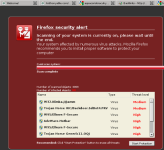Purveyors of fake security software don't let much grass grow under their feet and continually make improvements to their social engineering lures.
While most of the talk for the past month has been their move to Mac with fake Finder pop-ups that appear to scan your computer, they haven't stopped innovating on Windows either.
Their latest scam? They detect your user-agent string from your web browser and display a fake Firefox security alert if you are using the Mozilla Firefox web browser.
[attachment=351]
More details - link
Fake Firefox warnings lead to scareware
- Thread starter Jack
- Start date
You are using an out of date browser. It may not display this or other websites correctly.
You should upgrade or use an alternative browser.
You should upgrade or use an alternative browser.
This can't be good. To people that are not aware of the risks out there, this will definitely scare them. Make them aware that they should buy or get some security software.
Hackers are definitely getting more creative with their creations over time. Common Sense will still be the best compliment to your security setup.
stormgtr said:More users need to inspect the URL address bar, before being tricked by these scareware tactics.
Does Firefox change the colour of the Address bar, like IE does on unsafe websites?
No, the colour of the URL bar stays the same in Firefox (doesn't turn red)
Yes, they are getting alot smarter. I remember before it didn't matter what OS or browser you were using. If you were on Vista you would still get an XP my computer scan, so that was a dead giveaway for people.
I wonder though what they do for other browsers such as chrome etc...what kind of screen do they get?
V
Vextor
I've heard about this. It isn't the greatest news is it
I've heard that on Chrome they replace the Firefox with Chrome and keep the same interface
Tomo172 said:stormgtr said:More users need to inspect the URL address bar, before being tricked by these scareware tactics.
Does Firefox change the colour of the Address bar, like IE does on unsafe websites?
No, the colour of the URL bar stays the same in Firefox (doesn't turn red)
Yes, they are getting alot smarter. I remember before it didn't matter what OS or browser you were using. If you were on Vista you would still get an XP my computer scan, so that was a dead giveaway for people.
I wonder though what they do for other browsers such as chrome etc...what kind of screen do they get?
I've heard that on Chrome they replace the Firefox with Chrome and keep the same interface
Funny to see this thread show as it was only yesterday I encountered one of these (again on Google Images) ClearCloud didn't block it so I seen it, ALT + F4 and that was solved.
They detect your user-agent string from your web browser
Hmm, I have an add-on that lets me choose my user-agent, I might just glide around as a GoogleBot and see how it goes lol.. experiment should I ever come across another one of these fake warnings.

They detect your user-agent string from your web browser
Hmm, I have an add-on that lets me choose my user-agent, I might just glide around as a GoogleBot and see how it goes lol.. experiment should I ever come across another one of these fake warnings.

You may also like...
-
Arch Linux users told to purge Firefox forks after AUR malware scare
- Started by Gandalf_The_Grey
- Replies: 3
-
Mozilla warns Windows users of critical Firefox sandbox escape flaw
- Started by Gandalf_The_Grey
- Replies: 0
-
LastPass Warns of Phishing Scam via Fake Chrome Store Reviews
- Started by enaph
- Replies: 2
-
-
Arc browser’s Windows launch targeted by Google ads malvertising
- Started by Gandalf_The_Grey
- Replies: 0
